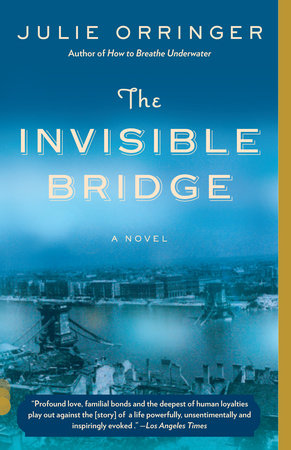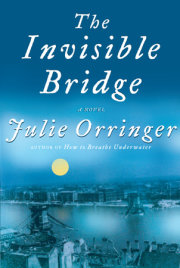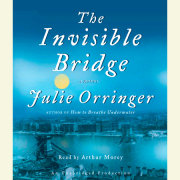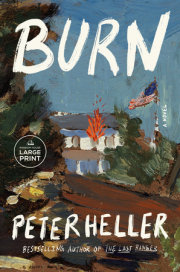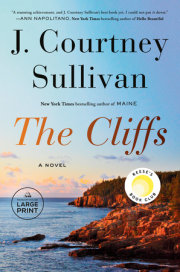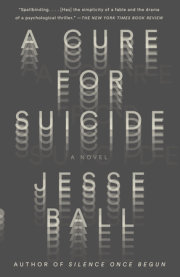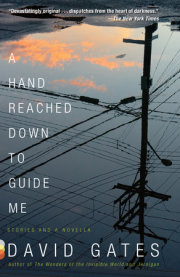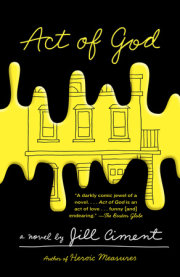CHAPTER ONE
A Letter
Later he would tell her that their story began at the Royal Hungarian Opera House, the night before he left for Paris on the Western Europe Express. The year was 1937; the month was September, the evening unseasonably cold. His brother had insisted on taking him to the opera as a parting gift. The show was
Tosca and their seats were at the top of the house. Not for them the three marble-arched doorways, the façade with its Corinthian columns and heroic entablature. Theirs was a humble side entrance with a red-faced ticket taker, a floor of scuffed wood, walls plastered with crumbling opera posters. Girls in knee-length dresses climbed the stairs arm in arm with young men in threadbare suits; pensioners argued with their white-haired wives as they shuffled up the five narrow flights. At the top, a joyful din: a refreshment salon lined with mirrors and wooden benches, the air hazy with cigarette smoke. A doorway at its far end opened onto the concert hall itself, the great electric-lit cavern of it, with its ceiling fresco of Greek immortals and its gold-scrolled tiers. Andras had never expected to see an opera here, nor would he have if Tibor hadn’t bought the tickets. But it was Tibor’s opinion that residence in Budapest must include at least one evening of Puccini at the Operaház. Now Tibor leaned over the rail to point out Admiral Horthy’s box, empty that night except for an ancient general in a hussar’s jacket. Far below, tuxedoed ushers led men and women to their seats, the men in evening dress, the women’s hair glittering with jewels.
“If only Mátyás could see this,” Andras said.
“He’ll see it, Andráska. He’ll come to Budapest when he’s got his baccalaureate, and in a year he’ll be sick to death of this place.”
Andras had to smile. He and Tibor had both moved to Budapest as soon as they graduated from gimnázium in Debrecen. They had all grown up in Konyár, a tiny village in the eastern flatlands, and to them, too, the capital city had once seemed like the center of the world. Now Tibor had plans to go to medical college in Italy, and Andras, who had lived here for only a year, was leaving for school in Paris. Until the news from the École Spéciale d’Architecture, they had all thought Tibor would be the first to go. For the past three years he’d been working as a salesclerk in a shoe store on Váci utca, saving money for his tuition and poring over his medical textbooks at night as desperately as if he were trying to save his own life. When Andras had moved in with him a year earlier, Tibor’s departure had seemed imminent. He had already passed his exams and submitted his application to the medical school at Modena. He thought it might take six months to get his acceptance and student visa. Instead the medical college had placed him on a waiting list for foreign students, and he’d been told it might be another year or two before he could matriculate.
Tibor hadn’t said a word about his own situation since Andras had learned of his scholarship, nor had he shown a trace of envy. Instead he had bought these opera tickets and helped Andras make his plans. Now, as the lights dimmed and the orchestra began to tune, Andras was visited by a private shame: Though he knew he would have been happy for Tibor if their situations had been reversed, he suspected he would have done a poor job of hiding his jealousy.
From a door at the side of the orchestra pit, a tall spindling man with hair like white flames emerged and stepped into a spotlight. The audience shouted its approval as this man made his way to the podium. He had to take three bows and raise his hands in surrender before they went quiet; then he turned to the musicians and lifted his baton. After a moment of quivering stillness, a storm of music rolled out of the brass and strings and entered Andras’s chest, filling his ribcage until he could scarcely breathe. The velvet curtain rose to reveal the interior of an Italian cathedral, its minutiae rendered in perfect and intricate detail. Stained-glass windows radiated amber and azure light, and a half-completed fresco of Mary Magdalene showed ghostly against a plaster wall. A man in striped prison garb crept into the church to hide in one of the dark chapels. A painter came in to work on the fresco, followed by a sexton bent upon making the painter tidy up his brushes and dropcloths before the next service. Then came the opera diva Tosca, the model for Mary Magdalene, her carmine skirts swirling around her ankles. Song flew up and hovered in the painted dome of the Operaház: the clarinetlike tenor of the painter Cavaradossi, the round basso of the fugitive Angelotti, the warm apricotty soprano of the fictional diva Tosca, played by the real Hungarian diva Zsuzsa Toronyi. The sound was so solid, so tangible, it seemed to Andras he could reach over the edge of the balcony and grab handfuls of it. The building itself had become an instrument, he thought: The architecture expanded the sound and completed it, amplified and contained it.
“I won’t forget this,” he whispered to his brother.
“You’d better not,” Tibor whispered back. “I expect you to take me to the opera when I visit you in Paris.”
At the intermission they drank small cups of black coffee in the refreshment salon and argued over what they’d seen. Was the painter’s refusal to betray his friend an act of selfless loyalty or self-glorifying bravado? Was his endurance of the torture that followed meant to be read as a sublimation of his sexual love for Tosca? Would Tosca herself have stabbed Scarpia if her profession hadn’t schooled her so thoroughly in the ways of melodrama? There was a bittersweet pleasure in the exchange; as a boy, Andras had spent hours listening to Tibor debate points of philosophy or sport or literature with his friends, and had pined for the day when he might say something Tibor would find witty or incisive. Now that he and Tibor had become equals, or something like equals, Andras was leaving, getting on a train to be carried hundreds of kilometers away.
“What is it?” Tibor said, his hand on Andras’s sleeve.
“Too much smoke,” Andras said, and coughed, averting his eyes from Tibor’s. He was relieved when the lights flickered to signal the end of the intermission.
After the third act, when the innumerable curtain calls were over—the dead Tosca and Cavaradossi miraculously revived, the evil Scarpia smiling sweetly as he accepted an armload of red roses—Andras and Tibor pushed toward the exit and made their way down the crowded stairs. Outside, a faint scattering of stars showed above the wash of city light. Tibor took his arm and led him toward the Andrássy side of the building, where the dress-circle and orchestra-floor patrons were spilling through the three marble arches of the grand entrance.
“I want you to have a look at the main foyer,” Tibor said. “We’ll tell the usher we left something inside.”
Andras followed him through the central doorway and into the chandelier-lit hall, where a marble stairway spread its wings toward a gallery. Men and women in evening dress descended, but Andras saw only architecture: the egg-and-dart molding along the stairway, the cross-barrel vault above, the pink Corinthian columns that supported the gallery. Miklós Ybl, a Hungarian from Székesfehérvár, had won an international competition to design the opera house; Andras’s father had given him a book of Ybl’s architectural drawings for his eighth birthday, and he had spent many long afternoons studying this space. As the departing audience flowed around him, he stared up into the vault of the ceiling, so intent upon reconciling this three-dimensional version with the line drawings in his memory that he scarcely noticed when someone paused before him and spoke. He had to blink and force himself to focus upon the person, a large dovelike woman in a sable coat, who appeared to be begging his pardon. He bowed and stepped aside to let her pass.
“No, no,” she said. “You’re just where I want you. What luck to run into you here! I would never have known how to find you.”
He struggled to recall when and where he might have met this woman. A diamond necklace glinted at her throat, and the skirt of a rose silk gown spilled from beneath her pelisse; her dark hair was arranged in a cap of close-set curls. She took his arm and led him out onto the front steps of the opera house.
“It was you at the bank the other day, wasn’t it?” she said. “You were the one with the envelope of francs.”
Now he knew her: It was Elza Hász, the wife of the bank director. Andras had seen her a few times at the great synagogue on Dohány utca, where he and Tibor went for an occasional Friday night service. The other day at the bank he’d jostled her as she crossed the lobby; she’d dropped the striped hatbox she was carrying, and he’d lost his grip on his paper folder of francs. The folder had opened, discharging the pink-and-green bills, and the money had fluttered around their feet like confetti. He’d dusted off the hatbox and handed it back to her, then watched her disappear though a door marked private.
“You look to be my son’s age,” she said now. “And judging from your currency, I would guess you’re off to school in Paris.”
“Tomorrow afternoon,” he said.
“You must do me a great favor. My son is studying at the Beaux-Arts, and I’d like you to take a package for him. Would it be a terrible inconvenience?”
A moment passed before he could respond. To agree to take a package to someone in Paris would mean that he was truly going, that he in?tended to leave his brothers and his parents and his country behind and step into the vast unknown of Western Europe.
“Where does your son live?” he asked.
“The Quartier Latin, of course,” she said, and laughed. “In a painter’s garret, not in a lovely villa like our Cavaradossi. Though he tells me he has hot water and a view of the Panthéon. Ah, there’s the car!” A gray sedan pulled to the curb, and Mrs. Hász lifted her arm and signaled to the driver. “Come tomorrow before noon. Twenty-six Benczúr utca. I’ll have everything ready.” She pulled the collar of her coat closer and ran down to the car, not pausing to look back at Andras.
“Well!” Tibor said, coming out to join him on the steps. “Suppose you tell me what that was all about.”
“I’m to be an international courier. Madame Hász wants me to take a box to her son in Paris. We met at the bank the other day when I went to exchange pengö? for francs.”
“And you agreed?”
“I did.”
Tibor sighed, glancing off toward the yellow streetcars passing along the boulevard. “It’s going to be awfully dull around here without you, Andráska.”
“Nonsense. I predict you’ll have a girlfriend within a week.”
“Oh, yes. Every girl goes mad for a penniless shoe clerk.”
Andras smiled. “At last, a little self-pity! I was beginning to resent you for being so generous and coolheaded.”
“Not at all. I could kill you for leaving. But what good would that do? Then neither of us would get to go abroad.” He grinned, but his eyes were grave behind his silver-rimmed spectacles. He linked arms with Andras and pulled him down the steps, humming a few bars from the overture. It was only three blocks to their building on Hársfa utca; when they reached the entry they paused for a last breath of night air before going up to the apartment. The sky above the Operaház was pale orange with reflected light, and the streetcar bells echoed from the boulevard. In the semidarkness Tibor seemed to Andras as handsome as a movie legend, his hat set at a daring angle, his white silk evening scarf thrown over one shoulder. He looked at that moment like a man ready to take up a thrilling and unconventional life, a man far better suited than Andras to step off a railway car in a foreign land and claim his place there. Then he winked and pulled the key from his pocket, and in another moment they were racing up the stairs like gimnázium boys.
Mrs. Hász lived near the Városliget, the city park with its storybook castle and its vast rococo outdoor baths. The house on Benczúr utca was an Italianate villa of creamy yellow stucco, surrounded on three sides by hidden gardens; the tops of espaliered trees rose from behind a white stone wall. Andras could make out the faint splash of a fountain, the scratch of a gardener’s rake. It struck him as an unlikely place for Jewish people to live, but at the entrance there was a mezuzah nailed to the doorframe—a silver cylinder wrapped in gold ivy. When he pressed the doorbell, a five-note chime sounded from inside. Then came the approaching click of heels on marble, and the throwing back of heavy bolts. A silver-haired housemaid opened the door and ushered him in. He stepped into a domed entrance hall with a floor of pink marble, an inlaid table, a sheaf of calla lilies in a Chinese vase.
“Madame Hász is in the sitting room,” the housemaid said.
He followed her across the entry hall and down a vaulted corridor, and they stopped just outside a doorway through which he could hear the crescendo and decrescendo of women’s voices. He couldn’t make out the words, but it was clear that there was an argument in progress: One voice climbed and peaked and dropped off; another, quieter than the first, rose and insisted and fell silent.
“Wait here a moment,” the housemaid said, and went in to announce Andras’s arrival. At the announcement the voices exchanged another brief volley, as if the argument had something to do with Andras himself. Then the housemaid reappeared and ushered Andras into a large bright room that smelled of buttered toast and flowers. On the floor were pink-and-gold Persian rugs; white damask chairs stood in conversation with a pair of salmon-colored sofas, and a low table held a bowl of yellow roses. Mrs. Hász had risen from her chair in the corner. At a writing desk near the window sat an older woman in widow’s black, her hair covered with a lace shawl. She held a wax-sealed letter, which she set atop a pile of books and pinned beneath a glass paperweight. Mrs. Hász crossed the room to meet Andras and pressed his hand in her large cold one.
“Thank you for coming,” she said. “This is my mother-in-law, the elder Mrs. Hász.” She nodded toward the woman in black. The woman was of delicate build, with a deep-lined face that Andras found lovely despite its aura of grief; her large gray eyes radiated quiet pain. He gave a bow and pronounced the formal greeting:
Kezét csókolom, I kiss your hand.
The elder Mrs. Hász nodded in return. “So you’ve agreed to take a box to József,” she said. “That was very kind of you. I’m sure you have a great deal to think about already.”
“It’s no trouble at all.”
“We won’t keep you long,” said the younger Mrs. Hász. “Simon is packing the last items now. I’ll ring for something to eat in the meantime. You look famished.”
“Oh, no, please don’t bother,” Andras said. In fact, the smell of toast had reminded him that he hadn’t eaten all day; but he worried that even the smallest meal in that house would require a lengthy ceremony, one whose rules were foreign to him. And he was in a hurry: His train left in three hours.
“Young men can always eat,” said the younger Mrs. Hász, calling the housemaid to her side. She gave a few instructions and sent the woman on her way.
The elder Mrs. Hász left her chair at the writing desk and beckoned Andras to sit beside her on one of the salmon-colored sofas. He sat down, worrying that his trousers would leave a mark on the silk; he would have needed a different grade of clothing altogether, it seemed to him, to pass an hour safely in that house. The elder Mrs. Hász folded her slim hands on her lap and asked Andras what he would study in Paris.
“Architecture,” Andras said.
“Indeed. So you’ll be a classmate of József?’s at the Beaux-Arts, then?”
“I’ll be at the École Spéciale,” Andras said. “Not the Beaux-Arts.”
The younger Mrs. Hász settled herself on the opposite sofa. “The École Spéciale? I haven’t heard József mention it.”
“It’s rather more of a trade school than the Beaux-Arts,” Andras said. “That’s what I understand, anyway. I’ll be there on a scholarship from the Izraelita Hitközség. It was a happy accident, actually.”
“An accident?”
And Andras explained: The editor of
Past and Future, the magazine where he worked, had submitted some of Andras’s cover designs for an exhibition in Paris—a show of work by young Central European artists. His covers had been selected and exhibited; a professor from the École Spéciale had seen the show and had made inquiries about Andras. The editor had told him that Andras wanted to become an architect, but that it was difficult for Jewish students to get into architecture school in Hungary: A defunct numerus clausus, which in the twenties had restricted the number of Jewish students to six percent, still haunted the admissions practices of Hungarian universities. The professor from the École Spéciale had written letters, had petitioned his admissions board to give Andras a place in the incoming class. The Budapest Jewish community association, the Izraelita Hitközség, had put up the money for tuition, room, and board. It had all happened in a matter of weeks, and at every moment it seemed as if it might fall through. But it hadn’t; he was going. His classes would begin six days from now.
“Ah,” said the younger Mrs. Hász. “How fortunate! And a scholarship, too!” But at the last words she lowered her eyes, and Andras experienced the return of a feeling from his school days in Debrecen: a sudden shame, as if he’d been stripped to his underclothes. A few times he’d spent weekend afternoons at the homes of boys who lived in town, whose fathers were barristers or bankers, who didn’t have to board with poor families—boys who slept alone in their beds at night and wore ironed shirts to school and ate lunch at home every day. Some of these boys’ mothers treated him with solicitous pity, others with polite distaste. In their presence he’d felt similarly naked. Now he forced himself to look at József?’s mother as he said, “Yes, it’s very lucky.”
“And where will you live in Paris?”
He rubbed his damp palms against his knees. “The Latin Quarter, I suppose.”
“But where will you stay when you arrive?”
“I imagine I’ll just ask someone where students take rooms.”
“Nonsense,” said the elder Mrs. Hász, covering his hand with her own. “You’ll go to József?’s, that’s what you’ll do.”
The younger Mrs. Hász gave a cough and smoothed her hair. “We shouldn’t make commitments for József,” she said. “He may not have room for a guest.”
“Oh, Elza, you’re a terrible snob,” said the elder Mrs. Hász. “Mr. Lévi is doing a service for József. Surely József can spare a sofa for him, at least for a few days. We’ll wire him this afternoon.”
“Here are the sandwiches,” said the younger, visibly relieved by the distraction.
The housemaid wheeled a tea cart into the room. In addition to the tea service there was a glass cake stand with a stack of sandwiches so pale they looked to be made of snow. A pair of scissorlike silver tongs lay beside the pedestal, as if to suggest that sandwiches like these were not m eant to be touched by human hands. The elder Mrs. Hász took up the tongs and piled sandwiches onto Andras’s plate, more than he would have dared to take for himself. When the younger Mrs. Hász herself picked up a sandwich without the aid of silverware or tongs, Andras made bold to eat one of his own. It consisted of dilled cream cheese on soft white bread from which the crusts had been cut. Paper-thin slices of yellow pepper provided the only indication that the sandwich had originated from within the borders of Hungary.
While the younger Mrs. Hász poured Andras a cup of tea, the elder went to the writing desk and withdrew a white card upon which she asked Andras to write his name and travel information. She would wire József, who would be waiting at the station in Paris. She offered him a glass pen with a gold nib so fine he was afraid to use it. He leaned over the low table and wrote the information in his blocky print, terrified that he would break the nib or drip ink onto the Persian rug. Instead he inked his fingers, a fact he apprehended only when he looked down at his final sandwich and saw that the bread was stained purple. He wondered how long it would be until Simon, whoever that was, appeared with the box for József. A sound of hammering came from far off down the hallway; he hoped it was the box being closed.
It seemed to please the elder Mrs. Hász to see that Andras had finished his sandwiches. She gave him her grief-etched smile. “This will be your first time in Paris, then.”
“Yes,” Andras said. “My first time out of the country.”
“Don’t let my grandson offend you,” she said. “He’s a sweet child once you get to know him.”
“József is a perfect gentleman,” said the younger Mrs. Hász, flushing to the roots of her close-set curls.
“It’s kind of you to wire him,” Andras said.
“Not at all,” said the elder Mrs. Hász. She wrote József?’s address on another card and gave it to Andras. A moment later, a man in butler’s livery entered the sitting room with an enormous wooden crate in his arms.
“Thank you, Simon,” said the younger Mrs. Hász. “You may leave it there.”
The man set the crate down on the rug and retreated. Andras glanced at the gold clock on the mantel. “Thank you for the sandwiches,” he said. “I’d better be off now.”
“Stay another moment, if you don’t mind,” said the elder Mrs. Hász. “I’d like to ask you to take one more thing.” She went to the writing desk and slid the sealed letter from beneath its paperweight.
“Excuse me, Mr. Lévi,” said the younger. She rose and crossed the room to meet her mother-in-law, and put a hand on her arm. “We’ve already discussed this.”
“I won’t repeat myself, then,” said the elder Mrs. Hász, lowering her voice. “Kindly remove your hand, Elza.”
The younger Mrs. Hász shook her head. “György would agree with me. It’s unwise.”
“My son is a good man, but he doesn’t always know what’s wise and what is not,” said the elder. She extricated her arm gently from the younger woman’s grasp, returned to the salmon-colored sofa, and handed the envelope to Andras. Written on its face was the name C. Morgenstern and an address in Paris.
“It’s a message for a family friend,” said the elder Mrs. Hász, her eyes steady on Andras’s. “Perhaps you’ll think me overcautious, but for certain matters I don’t trust the Hungarian post. Things can get lost, you know, or fall into the wrong hands.” She kept her gaze fixed upon him as she spoke, seeming to ask him not to question what she meant, nor what matters might be delicate enough to require this degree of caution. “If you please, I’d rather you not mention it to anyone. Particularly not to my grandson. Just buy a stamp and drop this into a mailbox once you get to Paris. You’ll be doing me a great favor.”
Andras put the letter into his breast pocket. “Easily done,” he said.
The younger Mrs. Hász stood rigid beside the writing desk, her cheeks bright beneath their patina of powder. One hand still rested on the stack of books, as though she might call the letter back across the room and have it there again. But there was nothing to be done, Andras saw; the elder Mrs. Hász had won, and the younger now had to proceed as though nothing out of the ordinary had happened. She composed her expression and smoothed her gray skirt, returning to the sofa where Andras sat.
“Well,” she said, and folded her hands. “It seems we’ve concluded our business. I hope my son will be a help to you in Paris.”
“I’m certain he will,” Andras said. “Is that the box you’d like me to take?”
“It is,” said the younger Mrs. Hász, and gestured him toward it.
The wooden crate was large enough to contain a pair of picnic hampers. When Andras lifted it, he felt a deep tug in his intestines. He took a few staggering steps toward the door.
“Dear me,” said the younger Mrs. Hász. “Can you manage?”
Andras ventured a mute nod.
“Oh, no. You mustn’t strain yourself.” She pressed a button in the wall and Simon reappeared a moment later. He took the box from Andras and strode out through the front door of the house. Andras followed, and the elder Mrs. Hász accompanied him to the driveway, where the long gray car was waiting. Apparently they meant to send him home in it. It was of English make, a Bentley. He wished Tibor were there to see it.
The elder Mrs. Hász put a hand on his sleeve. “Thank you for everything,” she said.
“It’s a pleasure,” Andras said, and bowed in farewell.
She pressed his arm and went inside; the door closed behind her without a sound. As the car pulled away, Andras found himself twisting backward to look at the house again. He searched the windows, unsure of what he expected to see. There was no movement, no curtain-flutter or glimpse of a face. He imagined the younger Mrs. Hász returning to the drawing room in wordless frustration, the elder retreating deeper behind that butter-colored façade, entering a room whose overstuffed furniture seemed to suffocate her, a room whose windows offered a comfortless view. He turned away and rested an arm on the box for József, and gave his Hársfa utca address for the last time.
Copyright © 2010 by Julie Orringer. All rights reserved. No part of this excerpt may be reproduced or reprinted without permission in writing from the publisher.

